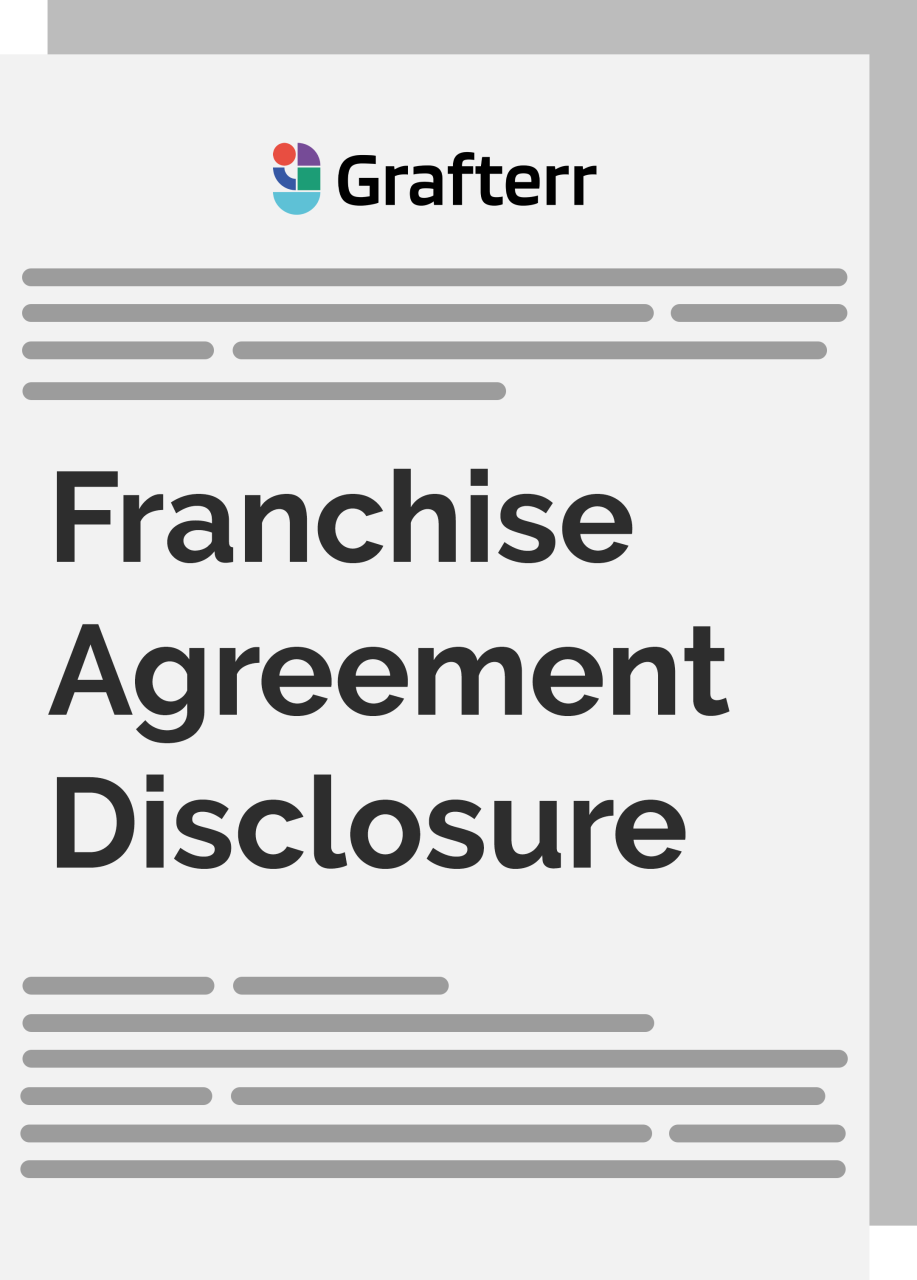Please note that the templates and content provided on this hub are intended for reference purposes only and should be customized to suit the specific needs of your business. While we strive to provide accurate and up-to-date information, it is important to understand that the templates and content are not a substitute for professional legal or financial advice. This info has been provided by grafterr.com
If you’re considering investing in a franchise, you’ll need to review the Franchise Disclosure Document (FDD) before making a decision. The FDD is a legal document that franchisors are required to provide to potential franchisees, and it contains important information about the franchise system, the franchisor, and the terms of the franchise agreement. However, the FDD can be lengthy and complex, making it challenging for prospective franchisees to understand and evaluate.
It is a complex legal document that can be lengthy and filled with legal jargon. As a result, it can be overwhelming for those who are not familiar with legal terms and franchising concepts. Moreover, the FDD contains a significant amount of information that may be difficult to interpret without professional guidance.
Rushing through the document may cause the franchisee to miss important details or overlook clauses that may have a significant impact on their business operations. Prospective franchisees should read each section carefully and take notes to ensure they understand the terms and conditions of the franchise agreement. By being diligent and seeking professional assistance, prospective franchisees can gain a clear understanding of the FDD and make informed decisions about their franchise investment.
In this article, we’ll provide an overview of what to look for in the FDD as a franchisee.

The Franchisor
The first section of the FDD will introduce the franchisor and, if applicable, its predecessors. This section will describe the franchisor’s background, experience, and standing in the industry. Investigate the corporate structure, ownership, and critical personnel of the franchisor. Additionally, you should examine any litigation or bankruptcy history disclosed in this section, as they may indicate potential risks or obstacles associated with the franchise system.

In addition, franchisees should review the franchisor’s financial statements, including balance sheets, income statements, and cash flow statements, to evaluate the franchisor’s financial stability. This can help prospective franchisees assess the franchisor’s ability to support the franchise system and provide ongoing training and support. Overall, the information contained in the first section of the FDD is crucial for prospective franchisees to evaluate the franchisor’s reputation, experience, and financial condition before making a decision to invest in the franchise system.
In contrast, the franchisor is the proprietor of the business concept and permits the franchisee the right to use it for an initial fee and ongoing royalties (Management service fees). The franchisor provides training, support, and ongoing assistance to the franchisee to ensure that the franchisee administers the business according to the franchisor’s standards.
Business Experience
The second section of the FDD provides information about the business experience of the franchisor’s key personnel. Look for information about the experience and qualifications of the franchisor’s executive team, as well as any specific industry experience that may be relevant to the franchise system. You should also review any material lawsuits or bankruptcies involving the franchisor’s key personnel, as this may indicate potential risks or challenges associated with the franchise system.
Litigation
The litigation section of the FDD is crucial as it provides information about any material lawsuits involving the franchisor or its affiliates. This section will give you a sense of the franchisor’s legal history and potential legal risks associated with the franchise system. It is important to carefully review this section as it can impact your decision to invest in the franchise. Look for information about the nature of the lawsuits, their outcomes, and any ongoing legal disputes that may be relevant to the franchise system. Pay attention to the frequency and severity of the legal disputes, as they can indicate potential issues with the franchisor.

As a prospective franchisee, it’s natural to have concerns while navigating the litigation section. You might be worried about investing in a franchise that has a history of legal issues. However, it is important to keep in mind that not all lawsuits are equal, and some may not necessarily be relevant to the franchise system. It’s essential to assess the severity and frequency of the legal disputes and determine if they pose a significant risk to the franchise system’s success. You should also look for any patterns or recurring issues that may indicate a problem with the franchisor’s business model or practices.
Another concern while navigating the litigation section is that the franchisor may not disclose all relevant legal disputes or may downplay their severity. To mitigate this risk, you can conduct your own research and perform a background check on the franchisor. You can also consult with a franchise attorney or a business advisor to help you understand the legal implications of the information presented in this section. By doing so, you can gain a more comprehensive understanding of the franchisor’s legal history and make an informed decision about investing in the franchise system.
Bankruptcy
This section provides information about any bankruptcies involving the franchisor or its affiliates. Look for information about the reasons for the bankruptcy, the outcome of the bankruptcy proceedings, and any ongoing financial challenges that may be relevant to the franchise system. A history of bankruptcies may indicate potential financial risks associated with the franchise system.

FEES
Initial Fees
Look for information about the initial franchise fee, any other fees required to open the franchise unit, and any ongoing fees required to maintain the franchise unit. You should also review any restrictions or limitations on the use of the initial fees, as well as any refund policies in the event that the franchise agreement is terminated.
Management Fees
In the UK franchise industry, management fees are typically charged to cover the cost of ongoing support and assistance provided by the franchisor. This section of the FDD should provide detailed information on the amount and frequency of management fees, as well as any restrictions or limitations on these fees. It is important to carefully review this section to ensure that you fully understand the ongoing financial obligations required to operate the franchise unit. Additionally, be sure to ask the franchisor about any additional fees that may not be listed in the FDD, such as training fees or software fees.

Other Fees
The other fees section is a crucial part of the FDD that you must pay close attention to. It outlines any additional fees that you may be required to pay beyond the initial franchise fee. These fees may include marketing and advertising fees, training fees, technology fees, or ongoing royalty fees. When reviewing this section, make sure to take note of the specific fee amounts, payment terms, and any restrictions on the use of the funds.
One important factor to keep in mind is the potential impact of these additional fees on your overall operating costs and profitability. You should evaluate whether the fees are reasonable and justified based on the services and benefits that the franchisor is providing. Additionally, it’s important to review the franchisor’s policies regarding the allocation and use of advertising and marketing funds. You should ensure that these funds are being used effectively to promote the franchise system as a whole and not just benefiting the franchisor’s interests.
Estimated Initial Investment
This section provides an estimate of the initial investment required to open a franchise unit. Look for a detailed breakdown of the estimated costs, including any costs associated with leasehold improvements, equipment, inventory, and other startup expenses. You should also review any assumptions or qualifications associated with the estimate, as well as any ongoing costs or fees required to operate the franchise unit.
Financial Performance Representations
In the UK, franchisors are not required to provide financial performance representations, also known as earnings claims, in the FDD. However, if the franchisor does choose to provide this information, it must be backed by documented evidence and comply with the Advertising Standards Authority guidelines. If financial performance representations are provided, carefully review this section to understand the potential earnings and profitability of the franchise unit. It is also important to ask the franchisor about any factors that may impact financial performance, such as location or competition.

If a franchisor does include financial performance representations in their FDD, it’s important to carefully review the data and consider how it applies to your individual circumstances. Remember, past performance is not a guarantee of future success, and there are many factors that can impact the financial performance of a franchise location, including location, competition, and local market conditions.

CONTRACTS
Finally, the FDD should include copies of all contracts that the franchisee will be required to sign, including the franchise agreement, any leases or subleases, and any other agreements related to the operation of the franchise.
It’s important to carefully review these contracts and seek legal advice if necessary. Make sure you understand all of the terms and obligations you are agreeing to, including any restrictions on your ability to sell or transfer your franchise, any fees you will be required to pay, and any requirements related to advertising, marketing, or operations.
In conclusion, navigating the franchise disclosure document can be a daunting task, but it’s an essential part of the due diligence process for prospective franchisees. By carefully reviewing the FDD and seeking the advice of legal and financial professionals, you can make an informed decision about whether a particular franchise opportunity is right for you. Remember, the FDD is just one piece of the puzzle when it comes to evaluating a franchise opportunity, and it’s important to consider all aspects of the business before making a final decision.
Overall, it is important to carefully review each section of the FDD to ensure that you fully understand the franchisor’s business model, financial requirements, and legal obligations. Additionally, be sure to ask the franchisor any questions or concerns that you may have and consult with a legal or financial professional if needed.

Grafterr, offers a free Franchise Agreement Disclosure Template specifically designed for food and beverage businesses. This template can serve as a starting point for franchisors who are new to the process, providing a clear framework for drafting a comprehensive and legally sound agreement.
By thoroughly reviewing the Franchise Agreement Disclosure Document, you gain a comprehensive understanding of the potential risks, rewards, and obligations associated with the franchise. It empowers you to make informed decisions based on facts and align your aspirations with the franchise opportunity. The Franchise Agreement Disclosure Document serves as a valuable resource to assess the viability of the business model, evaluate the franchisor’s track record, and ensure a fruitful partnership. With this knowledge in hand, you can confidently download the free template and take a significant step forward in your franchising journey.




